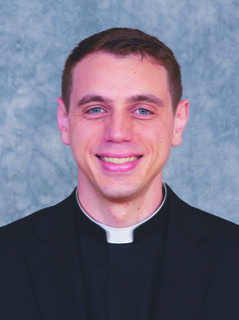
In our faith formation discussions for the month of November, we are taking a closer look at Baptism. Baptism is so simple, often celebrated with a small group of family and friends after a Sunday Mass. Don’t let this simplicity fool you! Baptism is the first of all sacraments received, and is thus described as the “basis of the whole Christian life” because of this (Catechism of the Catholic Church, #1213).
Baptism is unique among the sacraments because it can be administered by anybody – that’s right – anybody! In an ideal situation, an official minister of the Church such as a priest or deacon typically presides over the celebration of baptism. However, we all know that we do not live in an ideal world, and with surprising frequency, others may perform baptisms. The most common occurrence of this would be in hospitals when children are born with a health risk or prematurely. In that case, one of the parents, a chaplain, or even a nurse has the duty to baptize the baby as soon as possible to ensure that he or she enters through this doorway into God’s saving love.
Since Baptism is the normal way by which Original Sin is forgiven, Jesus has made this sacrament extremely accessible. All we need is some water and the knowledge of what the Church expects regarding the formula to be said during the pouring of the water. Although rare, it is possible even for non-Christians to be the minister of baptism. Nurses and doctors in Catholic hospitals could be trained to do this, in the event that a chaplain is not available for an emergency baptism. When I found this out, I was surprised that even somebody with no belief in Jesus could be the celebrant of this sacrament. After all, why would a non-Christian care about somebody else receiving Baptism? I’m sure we all know people of good will who understand how much faith means to us as Christians, and out of respect for our beliefs, would not be opposed to helping to facilitate a celebration of baptism. This is possible because the baptizing minister does not pass along his or her own faith to the child. Nor is the child baptized into the faith of the parents. It’s obviously better if both parents are people of great faith, but if one or both parents do not believe or practice their faith, this does not invalidate the baptism of the child. We are all baptized into the faith of the Church, which draws its life from Jesus Christ.
Sometimes children die shortly after receiving an emergency baptism. While nothing can compare to the pain of losing a child, the parents and family can be comforted in knowing that their child received the great gift of God’s life through baptism and is now a saint in heaven. If the child does survive after an emergency baptism, we can give thanks to God and still have a ceremony at the parish church in which a priest or deacon would perform the rest of the ritual surrounding the baptism, such as the presentation of the candle, white garment, and anointing with Chrism. Baptism is such a gift from God and I am very grateful that Jesus commanded us to “go and make disciples of all nations, baptizing them in the name of the Father, and of the Son, and of the Holy Spirit.”